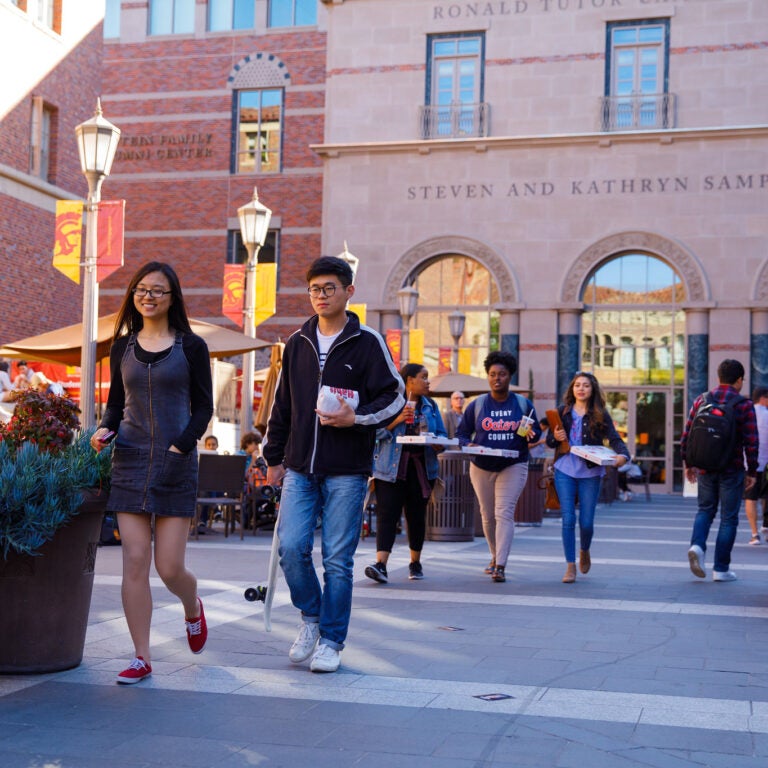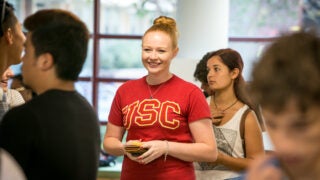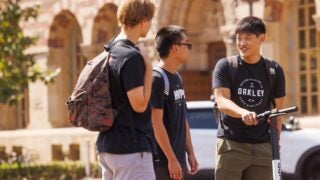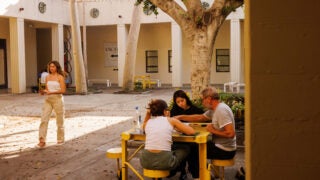Transfer Students
A World of Opportunity
As a transfer student at USC, you will enjoy unparalleled opportunities in and outside the classroom. From access to world-class faculty and the ability to conduct your own original research, to acquiring real-world experience through service learning and internship programs, the possibilities are endless. Transfer admission to USC remains competitive, and we look for students making progress toward USC graduation requirements and earning good grades in full-time academic coursework.

Essential Information
Successful Transfer Applicants:
- Present at least one year of rigorous, full-time academic coursework, with strong grades. Check out our Transfer Student Profile to see the average GPA of our most recent class of admitted transfer students.
- Show consistent progress toward a USC degree with at least one year of rigorous, full-time academic coursework. Competitive candidates typically take 14-16 units per term.
- Complete the equivalent of USC’s lower-division Writing requirement, Writing 130.
- Meet our minimum math requirement with a C of better in Algebra I, Geometry, and Algebra II (Advanced Algebra) in high school, or Intermediate Algebra in college with a grade of C or better. Many majors require additional math.
- Make satisfactory progress toward meeting USC General Education requirements.
- Complete additional lower-division courses required and/or recommended by their intended major, if applicable. Refer Additional Coursework by Major to see if your intended major requires lower-division courses that should be completed before you transfer. This is especially important for students pursuing degrees in science, engineering, architecture or business.
- International students whose native language is not English must also demonstrate English-language proficiency.
When to Transfer
USC accepts both sophomore and junior transfer students. By transferring as soon as your sophomore year, you can take more of your General Education and elective courses at USC. You will be part of the USC community for a longer time and have more opportunities to get involved with campus life and make the connections that can help you after graduation.
Alternately, if your academic record in high school fell short of USC expectations, you may be able to position yourself as a stronger candidate if you complete two years of solid undergraduate coursework at another institution before applying to transfer. Additionally, if you complete most of your General Education requirements before transferring, you will have more time to pursue a double major, a major-minor combination, or a unit-heavy major while you are enrolled at USC.
Current high school students, please note: If you are still in high school, USC considers you a first-year applicant, regardless of the number of college units completed prior to high school graduation. If you have questions about your class standing, please call the USC Office of Admission at (213) 740-1111.
Transfer Units
USC does not require a minimum number of transfer units.* If you will have earned fewer than 30 transferable semester units by the end of the spring term, however, we will base our decision in large part on your high school record and/or SAT or ACT scores (if you submit them). Please note that applicants to the 2026-2027 academic year are not required to submit SAT or ACT scores, although they may still submit them if they wish.
*The School of Cinematic Artsrequires 48 units to transfer into the Film and Television Production program.
College Transcripts
You must submit official transcripts from all colleges you have attended, regardless of whether or not all coursework or degree requirements were completed. This includes transcripts for college work completed prior to your high school graduation. Failure to do so may be viewed as a violation of academic integrity, which could result in revocation of admission and/or dismissal from the university.
Selecting a Major
Transfer applicants must indicate a first-choice major on the application. We also consider transfer students for an optional second-choice major or Undecided/Exploratory status.
English Proficiency Requirement
International transfer applicants whose native language is not English must submit a TOEFL, IELTS, PTE Academic or qualifying SAT or ACT test score earned within two years of their application date. More information is available under the English Proficiency section of our International Students page.
Remedial Coursework
Placement exams offered at your current college will determine your need for any remedial coursework in writing and mathematics prior to your admission to USC. Remedial courses are not transferable.
Required Courses Taken on a Pass/No Pass Basis
As many as 24 semester units, including up to 4 units of General Education courses, may be taken on a Pass/No Pass basis at USC. Note, however, that competitive applicants typically take few, if any, courses on a Pass/No Pass basis. Typically, only one Core Literacy course may be taken on a Pass/No Pass basis. Both Global Perspectives courses may be taken on a Pass/No Pass basis. Writing courses taken on a Pass/No Pass basis will not fulfill USC’s lower-division writing requirement.
Dates and Deadlines
You are considered a transfer applicant if you have enrolled in college since leaving high school.
For some majors requiring a portfolio or audition:
Application Deadline: December 1, 2025*
December 1 is the final deadline for transfer students applying to the following programs:
School of Cinematic Arts – BFA programs only
Kaufman School of Dance
School of Dramatic Arts – BFA programs only
Thornton School of Music
See Additional Major Requirements for information about your intended program.
All other majors
Application Deadline: February 15, 2026*
Final application deadline for all other majors.
*Application deadline extensions are considered on a case-by-case
basis. Students who are unable to meet the published deadlines
should contact an admission counselor to request an extension.
Regular Decision Notification: Late May
Transfer candidates will receive either an admission decision or a request for spring grades by the end of May. If you receive a request for spring grades, you will be notified of an admission decision by mid-July.
Financial Aid
Priority Filing Date: March 2, 2026
Applicants who wish to be considered for need-based financial aid must submit the FAFSA* and CSS Profile applications by this date.
California residents should also apply for Cal Grants by this date.
*Undocumented or DACA students should submit their 2024 tax return and third-party letter confirming undocumented status instead of the FAFSA.
Visit our Financial Aid page for more information. To check on the status of your financial aid application, visit your “Financial Aid Summary and Tasks (FAST)” portal.
Application Checklist
-
1
Complete the Common Application
If the application fee poses a financial burden, you may request a fee waiver through the “Profile” section of the Common Application.
-
2
Submit official final high school transcripts showing your date of graduation. Students who completed secondary school outside the U.S. may substitute a copy of a diploma or leaving certificate. Students who did not finish high school should submit transcripts showing any grades they received before leaving, as well as a copy of their completion certificate (such as a GED). These students may also submit a letter of explanation.
-
3
Submit official college transcripts from any and all colleges you attended (regardless of whether coursework or degree requirements were completed).
We need to review your most recent fall-term grades, so be sure your current school has posted them before transcripts are sent. If your school requires an email address to send electronic transcripts, please use uetrans@usc.edu. This email address should only be used by schools; students should not personally send copies of their transcripts to this address.
-
4
Letters of recommendation are not required unless specifically requested by your intended academic department or major.
-
5
Provide portfolio, résumé and/or additional writing samples, if required by your intended major. Performance majors may also require auditions. Refer to the Additional Application Requirements section below for more information.
-
6
Affirmations will be available in the portal after we receive your application. You will receive an email notification to log in to your portal to complete it. Your digital signature may be submitted after the application deadline.
Additional Application Requirements
If you are applying to any major in any of the schools listed below, it is your responsibility to complete your application by the appropriate deadline. Unless otherwise noted, all deadlines are the same as those listed in the Dates and Deadlines section. Be sure to obtain any required supplementary forms and to fulfill all departmental requirements.
Dornsife College of Letters, Arts and Sciences
Iovine and Young Academy for Arts, Technology and the Business of Innovation
Roski School of Art and Design
Alfred E. Mann School of Pharmacy and Pharmaceutical Sciences
Veterans
Veterans are encouraged to take advantage of an array of services at USC including academic and career counseling, financial aid and veteran benefits information, religious life resources and more. For more information, visit the USC Veterans Resource Center.
Application fee waivers are available to veterans and their dependents. To request this fee waiver, select the appropriate option under the school-specific fee waiver question, located in the “USC Questions” section of the Common Application.
Credits & Policies
Units That Must Be Earned at USC
Transfer students must complete a minimum of 64 units in residence at USC, or half the units typically required for graduation. A few exceptions are noted below. While in residence at USC, you are also expected to:
- Complete all upper-division units in your major and minor and any remaining lower-division courses not taken before entering USC.
- Complete WRIT 340, a minimum of two Core Literacy GE courses from a Dornsife College department, and any remaining General Education courses not taken before entering USC.
- Take all your fall- and spring-semester courses for credit at USC. Courses may be taken at other institutions only during summer sessions, with limitations.
Exceptions:
Engineering “3+2” Program: Students must complete a minimum of 48 units in residence at USC. Two-thirds of any transferable coursework must be completed at one of USC’s four-year partner institutions.
Bachelor of Architecture: Students must earn at least 80 units at USC. A maximum of 70 of the transferable units for this program may be earned elsewhere.
Transfer Unit Limits
USC limits the transfer of credit in certain categories.
- Four (4) units each of English as a Second Language, physical education activity courses and music ensemble courses.
- Eight (8) units of dance.
- Twelve (12) units of physical education theory courses.
- Sixteen (16) units of individual instruction in music.
- Other studio and performing arts classes are also limited. Check with your admission counselor.
Courses/Units That Will Transfer
Accredited courses: Coursework completed at, or degrees from, U.S. institutions accredited by the six regional accrediting agencies are generally accepted. Coursework completed at international post-secondary institutions approved by the local Ministry of Education as degree-granting institutions may also transfer.
Advanced Placement (AP), International Baccalaureate (IB) and other standardized examinations: We accept a maximum of 32 units for standardized examinations.
Please visit Transfer Credit Services for a list of standardized exams and the course requirements they fulfill.
College courses taken during high school: We accept a maximum of 16 units, included in the 32-unit combined maximum for AP/IB/other exam credits. These courses must be taught by college faculty on a college campus, appear on your college transcript as part of the regular college curriculum and must not be applied to your high school diploma. They can fulfill General Education requirements, but they cannot fulfill the writing or foreign language requirements nor receive equivalence to USC courses.
Courses/Units That May Transfer
Courses in these categories will be considered by petition, and credit is granted on a case-by-case basis. Be sure to keep copies of course syllabi, exams and papers, as we may ask for these in making our determination.
Nontraditional formats/time frames: Distance-learning, online courses, concentrated “intensive” sessions, special weekend modules, and other nontraditional course formats and time frames.
Please note that elective units only — not equivalence to USC courses or fulfillment of requirements — are granted for foreign language and laboratory science courses taught via distance learning, TV, or in an online or correspondence course.
Due to disruptions caused by COVID-19, some exceptions may apply.
Courses/Units That Will Not Transfer
Unaccredited institutions: Coursework or degrees completed at U.S. institutions not accredited by a regional accrediting agency.
No degree credit: College extension courses and courses taken at international institutions not credited toward a degree at that college.
Areas of study not offered by USC: These include agriculture, business office procedures, hotel management, food services, industrial mechanics, interior design, fire science, forestry, police academy, and similar professional and technical programs.
Duplicated material: An AP exam and IB exam or college course covering the same material.
Life and work experience: Including portfolio work, continuing education, equivalency examination units, and courses offered by business and governmental agencies (even if evaluated by the American Council on Education).
Placement exams: Courses and/ or unit credits awarded by another institution for placement examinations or credit by exam.
Remedial/college preparatory/personal development: Including mathematics courses below the level of college-level algebra. (Intermediate Algebra, USC’s minimum math requirement for admission, is not transferable.)
Nontraditional formats at two-year colleges: Including independent study, directed study, correspondence courses, internships and travel courses.
Graduate-level courses: Graduate-level coursework taken by undergraduate students.
Determining Your Transfer GPA
Credit/No Credit and Pass/No Pass marks are not included in the transfer GPA. USC does not honor other colleges’ academic “renewal” or “forgiveness” programs that permit students to improve a substandard grade. If you repeat a transferable course for which you earned a grade of D+ or lower, both grades will be included in your transfer GPA. If the grade on the first course was a C- or higher, only the first grade is included.
Your transfer GPA is different from the GPA earned in courses you take at USC. The transfer GPA and your USC GPA are kept separate until it is time to determine if you are eligible to graduate and earn graduation honors, as described in the USC Catalogue.
Academic Standards and Requirements
The USC Catalogue is the document of authority on policy matters, and it changes from time to time. It provides complete information about academic standards governing coursework taken at other colleges, as well as specific requirements for your major field. Please visit catalogue.usc.edu for the most current version.
Students who began college in fall 2015 or after:
Students are required to follow these revised General Education requirements if they graduated high school in spring or summer 2015 and their first full-time term of college enrollment was fall 2015 or after (excluding summers).
Students who began college prior to fall 2015:
Students who started at any college or university before summer 2015 will follow the Pre-Fall 2015 GE program.
Transfer Tools
This essential brochure will help you navigate the transfer admission process, detail what courses you must and should take, and explain our transfer policies. View the Transferring to USC brochure.
This online resource will help students attending California community colleges determine which undergraduate courses at other institutions will satisfy USC’s General Education courses, as well as the lower-division coursework required for any major. Visit the Interactive Planning Guide.
This worksheet will help you keep track of the required courses and transferable GE courses you have completed, are in progress or need to be completed. Download the Transfer Planning Worksheet.
Students who began full-time, college-level work prior to fall 2015 (excluding summer semesters) will need to follow the Pre-Fall 2015 General Education requirements.
Attend a Transfer Information Session
In this session, an admission counselor will discuss how credits transfer to USC and how to present a competitive transfer application. Sessions are offered in-person and online. Register for a Transfer Information Session.
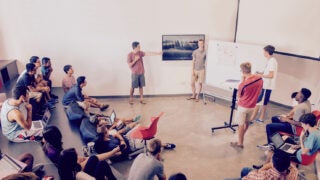
Find the lower-division, introductory coursework that may be recommended or required for your intended major. Download the Additional Coursework by Major document.
These lists indicate the California community college courses that fulfill General Education courses and the lower-division writing requirement, as well as equivalents to lower-division courses at USC. Visit Articulation Agreements with Community Colleges.
Though USC does not maintain formal articulation agreements with four-year colleges, this resource will help you determine which courses have been accepted for transfer in the past. Courses not included on the history have not yet been reviewed and may or may not transfer. Most academic courses from four-year institutions are accepted for transfer credit. Be sure to keep copies of syllabi and coursework in case they are needed for later review by USC. View Articulation Histories.
Undocumented and DACA Students
Information for undocumented and DACA students can be found on our Immigration & DACA Status page.
